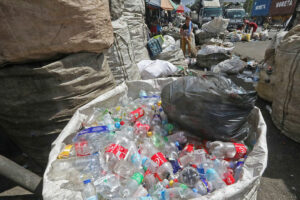VANCOUVER-BASED social enterprise Plastic Bank said it is proposing a “gamified” business model for collecting plastic waste, with participants incentivized to generate higher volumes with benefits like health insurance, grocery vouchers, and school supplies, apart from payments.
“We ultimately gamify the collection of material by providing a remarkable incentive in areas that are producing the most amount of the material,” Plastic Bank Chairman and Founder David Katz said at a media roundtable on Thursday.
Plastic Bank is evaluating parts of Mindoro, Antique, Cebu and other sites interested in becoming “collection and recycling ecosystems.”
Plastic Bank proposes to partner with junk shops and plastic waste collectors, who will be provided with digital tools and equipment to enable their waste collection efforts. The enterprises provide sacks, uniforms, weighing scales, and shop signage.
Collections are recorded via a mobile application which makes the collected plastic traceable through the recycling process and facilitates reporting on operational metrics.
“There will be a market fluctuations but we also provide an incentive and a bonus on top of that, so there is always a financial incentive all the time,” he said.
Plastic Bank currently operates in the Philippines, Indonesia, Brazil, and Egypt, with licensed partner-based expansion on the pipeline within Southeast Asia and Africa.
At present, the enterprise has about 36,000 registered members globally, including 8,000 in the Philippines, which has a network of 200 collection sites.
Plastic Bank Marketing Manager Camille Nuñez estimates that a member can earn an average of P8 to P15 per kilogram of collected material.
“The benefit of a member joining Plastic Bank is they earn incentives on top of the market price that they receive from the junk shop that they deliver the scraps to,” she said.
Plastics are sorted and transferred to an affiliated processor which will repurpose them into ethically sourced “social plastics,” for use by partner manufacturers like SC Johnson & Son, Inc.
“This is the challenge… recycling has been stigmatized. If someone sees you recycling, the conclusion is that you must be poor,” she said.
“We have to reduce the use of plastic. We have to eliminate virgin plastic production — that’s also a part of it because if we stop making more plastic, the demand for recycled content will increase, and the price will increase,” Mr. Katz said. — Sheldeen Joy Talavera

